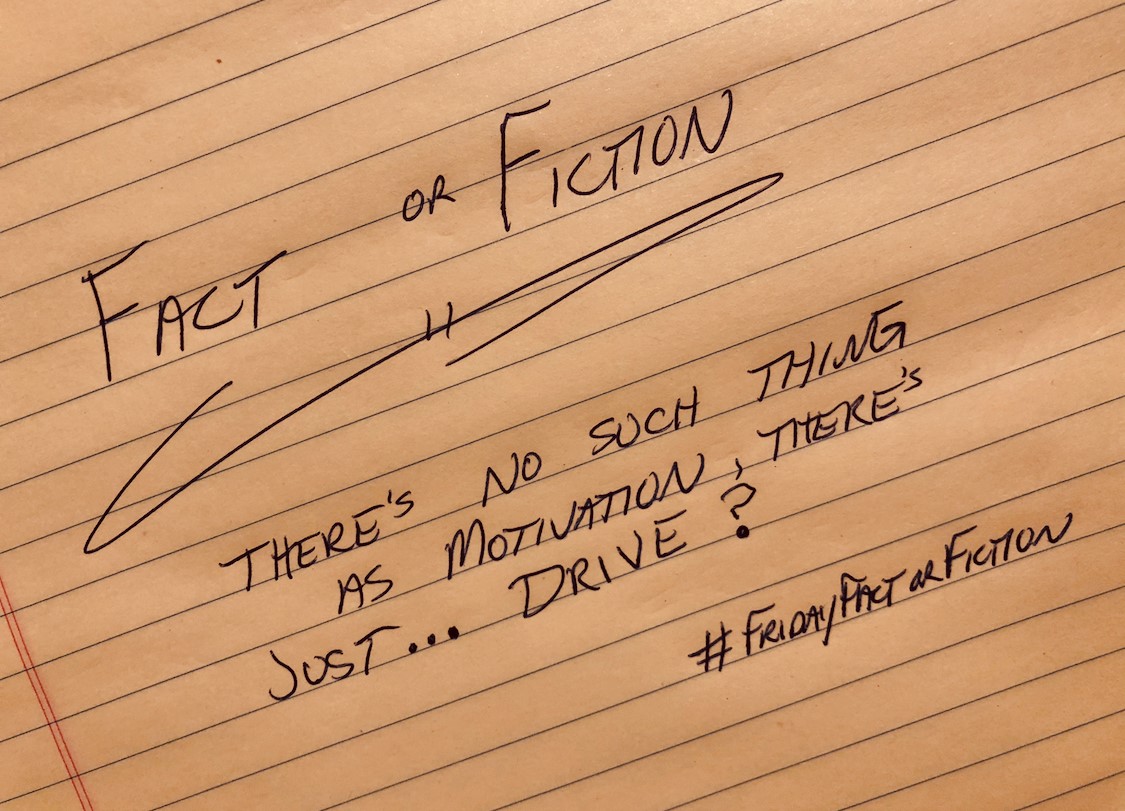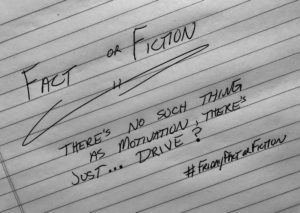
Friday Fact or Fiction – Does Motivation Really Exist?
A dive into the psychology behind what motivates and drives some of us to reach or surpass our health and fitness goals, while others fail. What’s the difference between having the motivation to do something, versus “Just Doing It”? Let’s take a closer look at the definition of motivation and drive:
Let’s compare two often used terms when it comes to getting our butts off the couch and propelling into action:


After taking a minute to compare Motivation and Drive, do you see the key difference?
One satisfies via external factors, while the other focuses more on an inward source. Does this mean one is better than the other? Does that mean that you can’t have one without the other? Maybe neither makes a difference when we’re trying to:
- Start a new fitness routine
- Plan out a better nutrition/food routine for the week
- Discovering a new craft or hobby
- Learning a new language, or any other variety of starting something new?
Motivation appears to be something that generates from a place of externally derived factors from life experiences. This is contrary to drive which appears to stem from something more biological. Drive then creates an inner sense of need, in the same way that we need food, water and shelter.
So what does this actually mean to me?
Why does this comparison mean anything to me? How many times have we all been there where we say, “I’m going to start this new fitness routine Monday.” only to find ourselves feeling guilty for eating pizza on Tuesday. By the time Friday rolls around, we’re drinking our 2nd glass of wine telling our friends how we’re going to start working out again on Monday.
What if we understood more of the psychology behind the driving factors that help to keep us on track. Factors which keep us “Motivated” & “Driven” to be at our best for the long term, similar to when we hear people talk of “Making it a Lifestyle”, or “Everything in Moderation”.
Ready… Set… Go!
No matter where we find our ability to show up each and everyday, or at least more days than less, understanding what your body wants to do versus what your mind is telling it to do is a key component to seeing long term, lasting results.
Of course the science behind things like taking 21 days to create a new habit, and how tracking progress helps progress itself, making it possible to get closer to that healthier “us” we’re all striving for.
Take some time when you can minimize distractions and on a sheet of paper, write down two column headings: Motivation & Drive
Under the Motivation column, list out all of the things in your life that you can think of which have been sources of reference when you feel inspired into action. These items can be things like:
- Seeing a professional athlete making an incredible play
- Listening to music that puts you in a positive mood
- Creating a playlist that helps you run longer or faster
- Remembering a time when you failed but didn’t give up
Then, under the Drive column, list out all of the behavioral habits you have which help keep you focused on a goal. This can be things similar to:
- That urge to eat something bad but you find a way to avoid it
- Knowing that if you start binge watching Netflix at 10pm, it’s likely you’ll get a horrible nights sleep because you won’t end up going to bed until 3am and have to be up by 6.
- Doing things out of guilt, but not necessarily because you wanted to
Do you notice the difference between the factors of both columns. One column’s items are based on decisions you make to stay focused on your goals by changing your behavioral needs or “urges” whereas the other column is about externally acquired sources of focus?
Final Thoughts
It’s likely that the experts will argue that motivation comes from within, and other experts will argue the opposite. However, the point we’re trying to drive home here (no pun intended) is that if we’re struggling to stay on target with a goal, sometimes just understanding the psychology behind our actions can help us gain insight into why we fail or succeed.
In the end, having this deeper understanding can help lead us all into a path of a more consistent and repeatable pattern of behavior, which leads to long lasting, healthier choices and results!
Until next time, thanks for stopping by… #FridayFactOrFiction


